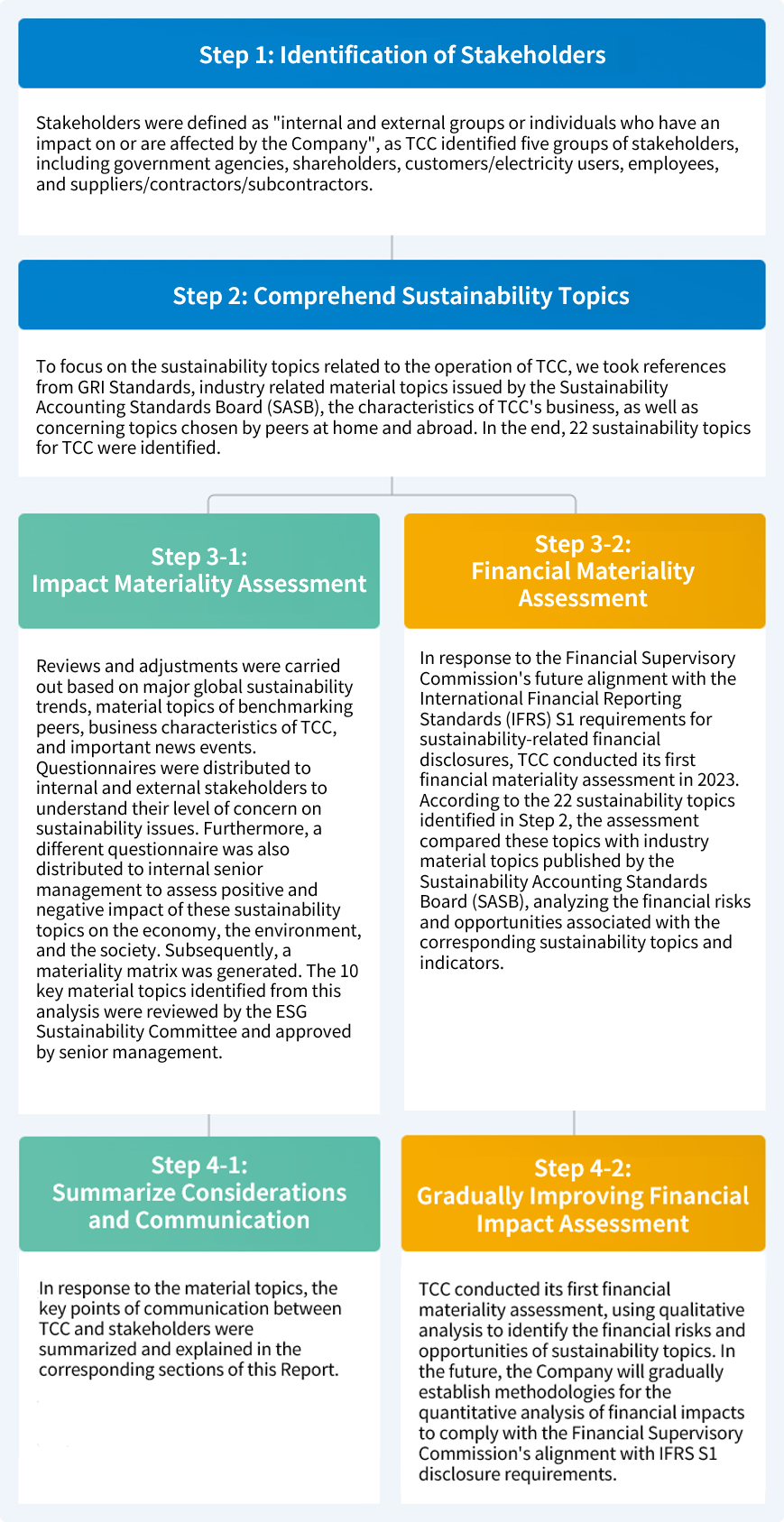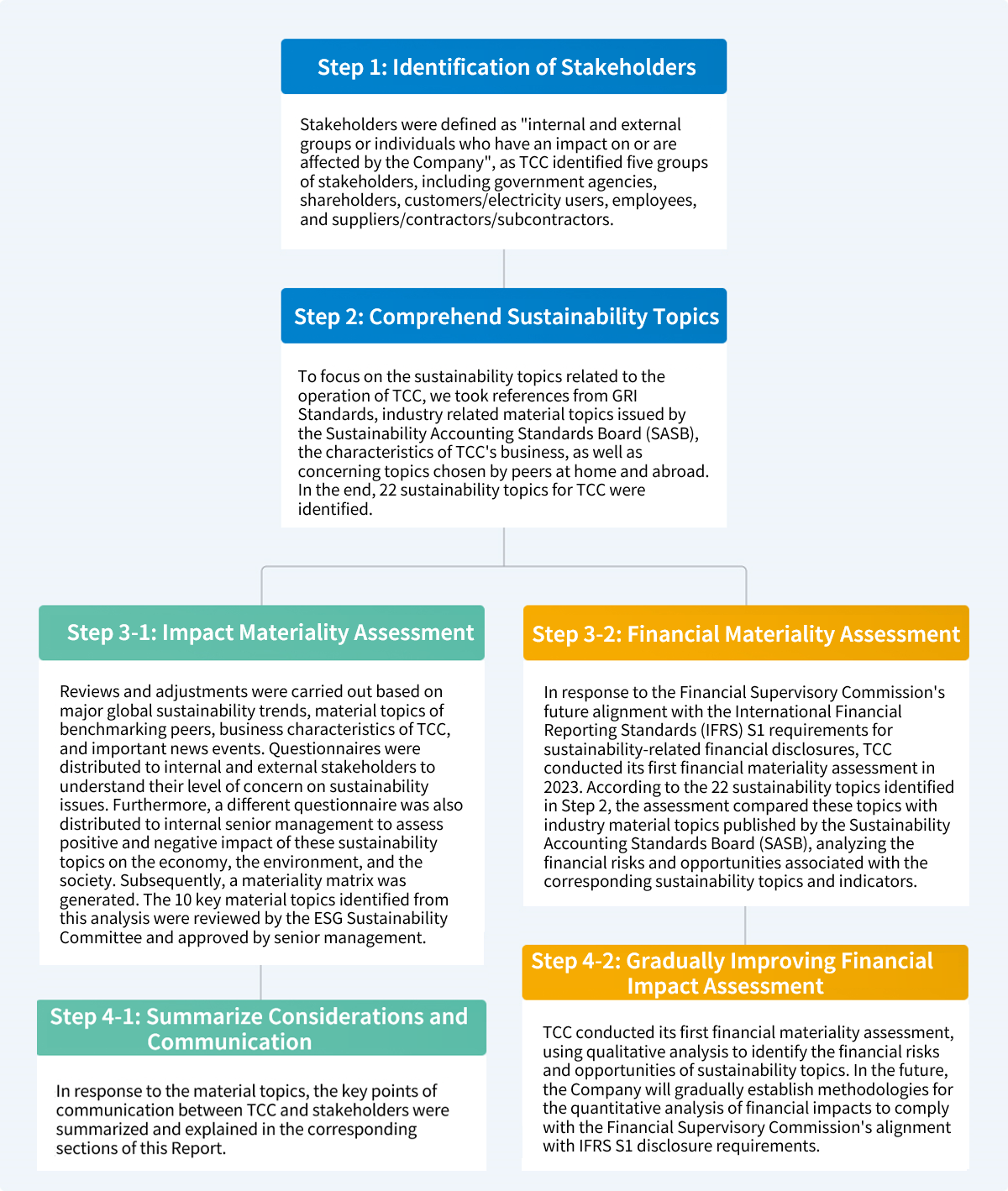Materiality Assessment Process
Double Materiality Analysis Process
Referring to the principle of Double Materiality outlined by the European Commission in the "Guidelines on Non-financial Reporting: Supplement on Reporting Climaterelated Information", it is recommended that companies consider not only the external sustainability impacts of their operations but also analyze the financial impacts of external environmental factors on the company. Accordingly, in 2023, TCC conducted internal and external surveys and confirmed with senior management to execute a fourstep process for assessing "Impact Materiality" and "Financial Materiality".


Results of Material Topics Analysis
Sustainability Impact Materiality Assessment
Based on GRI Standards and GRI Electric Utilities Sector Disclosures, with references to international sustainable development trends concerned by peer groups at home and abroad, TCC integrated three major ESG dimensions: environmental protection, human rights protection & social participation, and corporate governance, to identify 22 sustainability topics related to the Company's operations.
Through surveys and stakeholder wieght culculation, we compile the level of concern of various stakeholders, and generate a materiality analysis matrix. Combining stakeholders' level of concern and sustainability impact assessments, a materiality matrix was produced. After discussions by the ESG Sustainability Committee, 10 material topics were identified as the basis for the information disclosed in this Report. The results of the materiality analysis were also submitted to the Board of Directors.
In addition to the 10 material topics, TCC voluntarily disclosed the sustainability performance and actions of non-material topics, such as air pollution prevention and customer relations, to address stakeholder concerns and important sustainability trends. TCC continuously sets management guidelines for each material topic, regularly tracks and reviews implementation outcomes and effectiveness, and discloses the setting and implementation results of various management indicators in corresponding sections. This information serves as a reference for internal and external stakeholders and a cornerstone for the Company's sustainable development.
Through surveys and stakeholder wieght culculation, we compile the level of concern of various stakeholders, and generate a materiality analysis matrix. Combining stakeholders' level of concern and sustainability impact assessments, a materiality matrix was produced. After discussions by the ESG Sustainability Committee, 10 material topics were identified as the basis for the information disclosed in this Report. The results of the materiality analysis were also submitted to the Board of Directors.
In addition to the 10 material topics, TCC voluntarily disclosed the sustainability performance and actions of non-material topics, such as air pollution prevention and customer relations, to address stakeholder concerns and important sustainability trends. TCC continuously sets management guidelines for each material topic, regularly tracks and reviews implementation outcomes and effectiveness, and discloses the setting and implementation results of various management indicators in corresponding sections. This information serves as a reference for internal and external stakeholders and a cornerstone for the Company's sustainable development.
Material Topics for 2023
01
Electricity Policy Evaluation and Response
02
Corporate Governance and Sustainability Strategy
03
Economic Performance
04
Risk Management/Control
05
Supply Stability and Reliability
06
Renewable Energy Development
07
Integrity Management and Legal Compliance
08
Occupational Safety and Health
09
Talent Management and Development
10
Energy Management and Circular Economy
Financial Materiality Assessment
To gradually implement the IFRS S1 disclosure standards, TCC referenced the S1 framework and conducted its first financial materiality analysis in advance in 2023. In the first year, a qualitative approach was used to analyze the financial impact of various topics on the Company's value chain positions, the timing of impact occurrences, potential financial risks and opportunities, as well as financial impact factors.
The evaluation process and method were as follows: The 22 sustainability topics related to the Company's operations that were identified by the sustainability impact materiality assessment served as the basis and were compared with the indicators in the SASB Electric Utilities & Power Generators standards. This further filtered out 8 sustainability topics with financial materiality. Additionally, considering the management insights of TCC's senior executives, and in line with TCC's business model, "Renewable Energy Development" was included as a financially material topic. Therefore, a total of topics were classified as financially material topics for TCC.
The evaluation process and method were as follows: The 22 sustainability topics related to the Company's operations that were identified by the sustainability impact materiality assessment served as the basis and were compared with the indicators in the SASB Electric Utilities & Power Generators standards. This further filtered out 8 sustainability topics with financial materiality. Additionally, considering the management insights of TCC's senior executives, and in line with TCC's business model, "Renewable Energy Development" was included as a financially material topic. Therefore, a total of topics were classified as financially material topics for TCC.
- For further information please refer to 2023 Sustainability Report "Analysis of Material Issues" Chapter
TCC's Financially Material Topics
01
Climate Change Response
02
Electricity Policy Evaluation and Response
03
Occupational Safety and Health
04
Energy Management and Circular Economy
05
Renewable Energy Development
06
Air Quality
07
Water Management
08
Waste Management
09
Supply Stability and Reliability